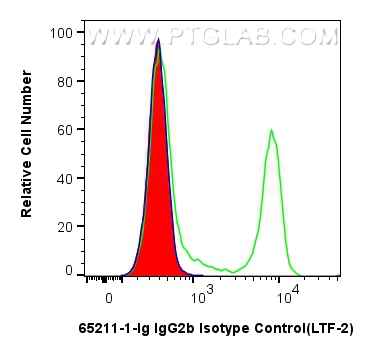验证数据展示
经过测试的应用
| Positive FC detected in |
Planning an IF experiment? We recommend our CoraLite® Plus 488, CoraLite® Plus 555 and CoraLite® Plus 647 conjugated versions of this antibody.
推荐稀释比
| 应用 | 推荐稀释比 |
|---|---|
| Flow Cytometry (FC) | FC : 0.25 ug per 10^6 cells in 100 μl suspension |
| This reagent has been tested for flow cytometric analysis. It is recommended that this reagent should be titrated in each testing system to obtain optimal results. | |
| Sample-dependent, Check data in validation data gallery. | |
发表文章中的应用
| IF | See 1 publications below |
产品信息
65211-1-Ig targets IgG2b Isotype Control in IF, FC applications and shows reactivity with samples.
| 经测试应用 | FC Application Description |
| 文献引用应用 | IF |
| 经测试反应性 | |
| 免疫原 |
N/A 种属同源性预测 |
| 宿主/亚型 | Rat / IgG2b, kappa |
| 抗体类别 | Monoclonal |
| 产品类型 | Antibody |
| 全称 | IgG2b Isotype Control |
| 别名 | Rat IgG2b Isotype Control, IgG2b |
| 基因名称 | |
| Gene ID (NCBI) | |
| RRID | AB_2881487 |
| 偶联类型 | Unconjugated |
| 形式 | Liquid |
| 纯化方式 | Affinity purification |
| 储存缓冲液 | PBS with 0.09% sodium azide, pH 7.3. |
| 储存条件 | Store at 2-8°C. Stable for one year after shipment. |
背景介绍
The LTF-2 immunoglobulin is useful as an isotype-matched control. The LTF-2 immunolglobulin has an unknown binding specificity and is used as an isotype control for rat IgG2b antibodies. This antibody has been quality-tested for flow cytometry as negative control.
实验方案
| Product Specific Protocols | |
|---|---|
| FC protocol for IgG2b Isotype Control antibody 65211-1-Ig | Download protocol |
| Standard Protocols | |
|---|---|
| Click here to view our Standard Protocols |
发表文章
| Species | Application | Title |
|---|---|---|
Nat Commun The methyltransferase METTL3 negatively regulates nonalcoholic steatohepatitis (NASH) progression. | ||
Front Endocrinol (Lausanne) Ovaries of estrogen receptor 1-deficient mice show iron overload and signs of aging |


